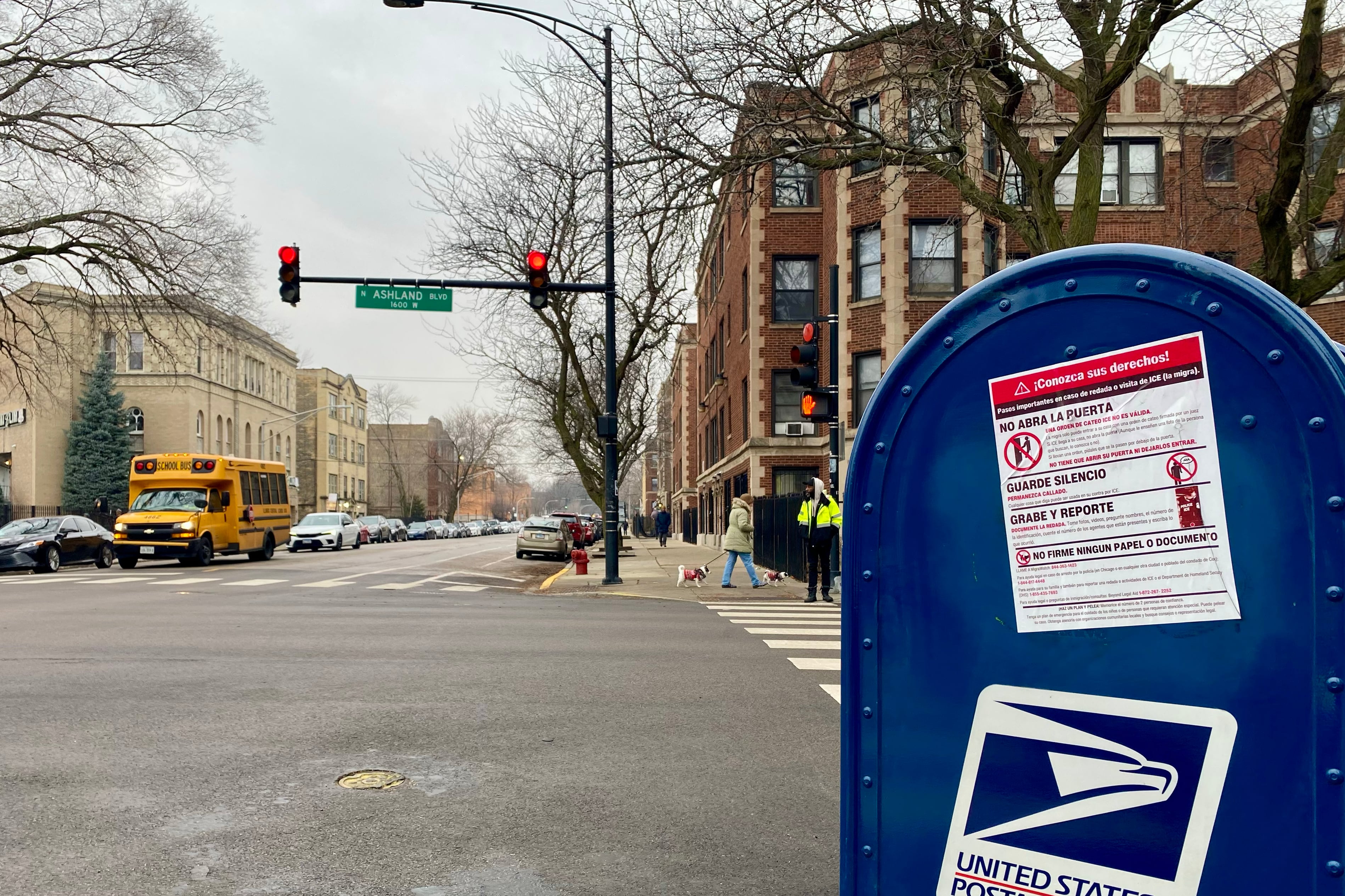Sign up for Chalkbeat Chicago’s free daily newsletter to keep up with the latest news on Chicago Public Schools.
In the last two years, Cristina, the mother of two middle schoolers on Chicago’s Southwest Side, moved to the city and joined the parent mentor team at her children’s school.
That role gives Cristina and other parent mentors a front-row seat to the needs of students and families. This year, it also put them face-to-face with an unexpected crisis: the impact of the Trump administration’s immigration enforcement push targeting Chicago.
Over the last two months, armed, masked agents from Immigration and Customs Enforcement, Border Patrol, and other federal agencies have fanned out across neighborhoods, rousting people as they worked or slept — sometimes detaining U.S. citizens — and fueling dread among the city’s immigrants.
The anxiety has spilled into schools. Recently, Cristina said, she walked into a classroom that is usually filled but saw many empty seats.
“Because they just have not been coming in,” said Cristina, one of seven moms who work on parent mentor teams and talked to Chalkbeat on the condition that their full names not be used out of fear that federal agents might target them or people they support.
The moms, who joined the parent mentor program through a community organizing group, are part-time workers and volunteers; some work one-on-one with students during the week and others provide support to those volunteers. Since the stepped-up immigration enforcement campaign began, they’ve noticed fewer kids coming to school and parents worried about bringing them. They’ve heard from families afraid to leave home.
Even as these moms, many of whom are immigrants themselves, plugged away at their work in schools, they felt called to take on new responsibilities to help their neighbors feel safer.
One of the moms, Mary, helped spark the idea for a food drive at her school. Another has joined a grassroots rapid response team that is supposed to watch for federal immigration enforcement activity, including around schools. A third is giving kids rides to school. All have shared information with families about legal rights for people of varying immigration statuses across the community.
“I told my kids, ‘Look for the helpers,’ and normally you think that would be policemen, firemen — it’s not them. It’s us,” said Krystal, another parent mentor worker. “It’s the women on the street who are blowing the whistle. It’s the principal standing out front trying to make sure everyone gets picked up correctly and no one gets taken.”
How immigration enforcement is affecting Chicago schools
On the Southwest Side, signs of the immigration crackdown are everywhere. Federal agents took over a parking lot across from Back of the Yards High School, sprayed tear gas into crowds, and clashed with protesters, including an incident during which local elected officials said they detained students from Juarez High School.
In other parts of the city, agents have released tear gas near a Logan Square elementary school and during a Halloween parade and detained a day care teacher at a private child care facility. She was later released after a federal judge said her detention without bond was illegal.
The fear is palpable, the mothers who spoke to Chalkbeat said, and it feels like people are often targeted because of the color of their skin, regardless of immigration status or criminal background.
The specter of immigration enforcement activity in Chicago permeates social media and is present in conversations at school and work. The arrests of street vendors is particularly jarring in their culture, the mothers said, because it feels like agents are “attacking the weakest of us all.”
And it’s having a deep impact on children and schools, they said.
Several said they have reduced their daily routines, focusing only on getting to and from school or work. Some are afraid of dropping kids off to school. Teachers are helping give rides, and sometimes students wait for hours to get a ride home, some of the mothers said.
Attendance at CPS schools dropped after the immigration blitz was announced Sept. 8, a Chalkbeat analysis of student-level attendance data found.
Several of the mothers who talked to Chalkbeat described their own children who are CPS students growing more anxious about parents leaving home. Two said their children’s grades are dropping. A recent study of a school district in Florida linked a modest dip in spring test scores with Trump’s increased immigration enforcement policies.
When Mary tells her teenage daughter that she’s leaving home or attending a meeting, “she’s like, ‘Mom, no, don’t go, don’t go,’ or she’s sending messages [saying] ‘Where you are? What time you’re gonna come back?’”
At school, Mary said the presence of nearby trucks with blacked-out windows can spark panic among educators and families that federal agents are outside.
Another mother, who asked to be identified as Ms. Hernandez, said before this year, her son was interested in dance and theater and was known as a “politician” because he would talk to anyone. Since immigration enforcement has ratcheted up, he’s become more anxious, focused more on videos of federal agent activity on social media and keeping indoors.
The 14-year-old has started carrying a stuffed toy with him when he walks to “calm himself down,” she said.
Parent workers step up to help amid fears
The immigration crackdown has created a difficult balancing act for the moms in the parent mentor group, who are focused both on more stressful situations in their school roles and helping to protect neighbors.
That might mean helping guide other parent volunteers during the school day, then rushing out to the scene of a rumored ICE raid as part of a “rapid response team.”
Many Chicago communities, including those in wealthier, whiter communities, have set up daily watches for federal agents outside of schools, confronting agents when they pull people off landscaping jobs or in businesses or blowing orange whistles to alert neighborhoods about ICE activity. Involved parents are openly starting GoFundMe pages or gathering support for families whose relatives have been detained by federal law enforcement.
But on the Southwest Side, where so many people fear making themselves or their relatives targets, it can be difficult to get lots of people involved, the moms said.
At Cristina’s school, an organization passed out Know Your Rights cards and offered whistles during parent-teacher conferences. Many parents didn’t show up, and many of those who did did not want to grab whistles because they worried if they’d be “putting myself and my family in danger” by pushing back on federal agents, Cristina said.
Other times it’s hard to get families to open up and ask for help because they don’t want to draw attention to themselves or simply because they’re not used to relying on others, the mentors said.
“We got each other, but we’re also scared,” Krystal said. “We’re very, very scared.”
Still, the mentors have been checking in with the parents at their schools. They said they feel proud of what they and many others have done across the Southwest Side to help families feel safe: Preparing meals, giving people rides, sharing information.
Cristina created a binder full of information to share among families at different schools in the area, including on legal rights for people of various immigration statuses and family emergency plans if parents are detained. She’s encouraged the other moms to share whatever they feel is important for their school communities. Every mom said she distributed the information to parent volunteers and families in their schools.
Mary was getting grocery requests from mothers of young children. One of them said she didn’t want to leave home “because if they take me, what are they going to do with my kids?” Mary recalled.
She relayed those requests to a teacher at her school, who was also hearing from students that their families were in need of help with groceries. Together they came up with the idea of collecting donations for school families, she said.
Hernandez is part of a rapid response team. Last month, another mother’s daughter said she saw someone waiting for a bus detained by federal agents outside her home. That mother alerted Hernandez, who then informed her fellow team members. The team drove around the immediate area and nearby schools to see if any agents were nearby.
Sometimes, Hernandez is the one who checks for ICE agents when their team receives a report, she said. They recently received an alert of a local bread vendor getting picked up by agents; the woman was gone before the rapid response team arrived, Hernandez said. They couldn’t figure out her name, making it nearly impossible to figure out where she’s being held or how to help her.
When Hernandez meets with parent volunteers or goes home to her own family, “we have to put on our strong face,” she said.
But the work can take a toll. Sometimes when she gets back in her car after going to school, she’ll take a moment to cry. Then it’s time for the next task.
Reema Amin is a reporter covering Chicago Public Schools. Contact Reema at ramin@chalkbeat.org.






